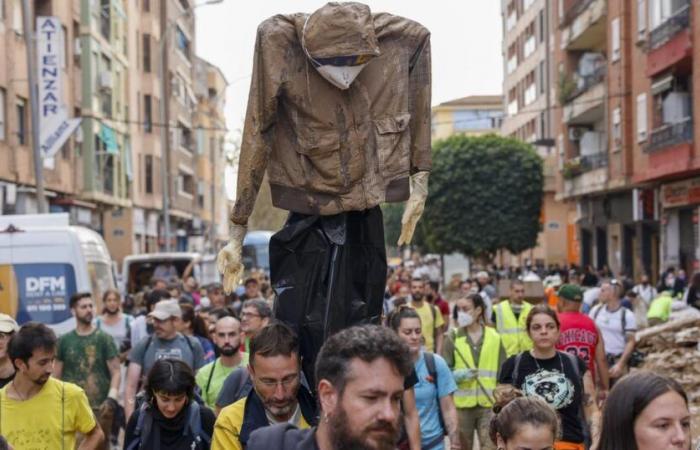With cries of “assassins”, tens of thousands of people demonstrated their anger on Saturday in Valencia against the political class for their management of the floods which left at least 220 dead in the south-east of Spain last week.
According to the government delegation in Valencia, the demonstration brought together “130,000 people.
The demonstrators met at the end of the day on the large square in front of the Valencia town hall to walk the kilometer that separates it from the headquarters of the regional government.
At the end of the rally, confrontations with the police took place, and the officers were stoned by the demonstrators. Around thirty police officers were injured and three people arrested.
Rallies also took place in several other Spanish cities, such as Madrid and Alicante.
The president of the Valencia region Carlos Mazón concentrates much of the anger of the victims. He was targeted on Sunday in Paiporta, like the head of government and the sovereigns, with insults and mud throwing – unprecedented images illustrating the exasperation in the devastated areas.
>> Rewatch the 7:30 p.m. topic on the explosion of anger in Paiporta:
>> Read also: Spanish leaders greeted with cries of “assassins!” by the victims of the Valence region
But socialist Prime Minister Pedro Sánchez has not been spared criticism either. The two men are accused of having underestimated the risks and poorly coordinated relief efforts after the floods of October 29.
Alert not or barely relayed
Figure of the Popular Party (PP, right), Carlos Mazón is accused of having been slow to react even though the Spanish Meteorological Agency (Aemet) had issued a red alert on the morning of October 29.
This 50-year-old lawyer is also accused of being absent for several hours when it was already starting to rain and the emergency committee had met. Carlos Mazón defended himself by assuring that he was participating in “a working lunch” in a restaurant in Valencia, with a journalist, according to Spanish media.
Among the accusations also made by the victims, the fact that the entire population was only alerted via their mobile phones in the evening, when many areas were already submerged. The region’s main emergency manager, Salomé Pradas, admitted on Thursday that she was unaware of the existence of this alert system, before retracting her statement.
Poor coordination with central government
In Spain, a very decentralized country, disaster management is indeed the responsibility of regional administrations, but the central government, responsible for issuing alerts via Aemet, can provide resources and even take control. in extreme cases.
It is precisely this last point which motivates the criticism of the right-wing opposition, which accuses the head of the socialist government of having allowed the region to sink through political calculations instead of regaining control. Pedro Sánchez acted “in bad faith”, criticized Miguel Tellado, the PP spokesperson in Parliament.
Responsibilities to be established
Sources close to the government assure for their part that they want to define in due time the possible responsibilities of each person and the possible failures in the management of the disaster, while affirming that the government has done everything it could do within the current institutional framework. .
But for the socialist mayor of Alaquas Toni Saura, “the coordination between the administrations was chaotic”, according to comments reported in the Valencian daily Levante.
“Solo el pueblo salva el pueblo” (Only the people save the people, editor’s note): in Valencia, this slogan became popular in conversations after the spontaneous wave of solidarity which was organized to compensate for the errors of the authorities.
cab with afp






